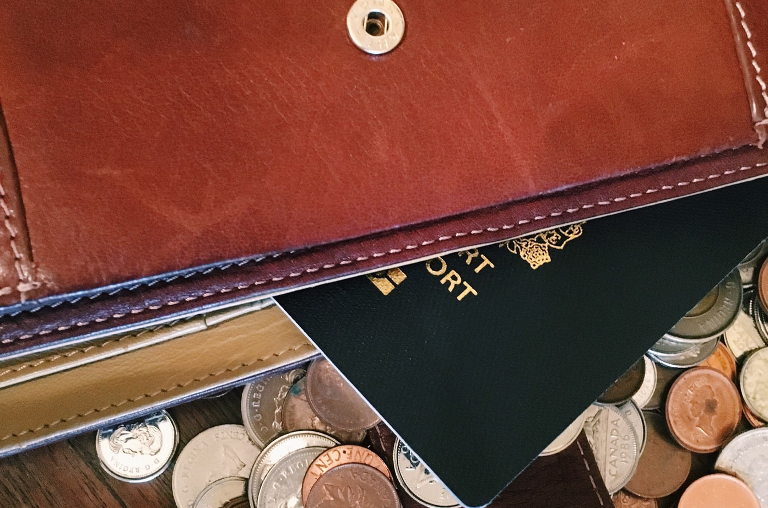A cascade of flakes skitters across the frozen land. A single morsel of snow, one of a billion messengers bridging the heavens with the soil, alights gently on my rested boot tip. These are not the same boots which sounded the Michigan trail over fifteen months ago, and those backcountry ribbons seem now far away.
Today, I sit at the peak of a hill near that once-autumn-tinged college campus, gazing at the expansive metropolis spread out in the distance. The cityscape is distant, shrouded—yet all about, humans scatter to and fro with urgency; vehicles shuttle back and forth on slick pavements, rails, and air currents, and life within its thin atmospheric sheath hums with communication and energy.
Pretty soon, I’ll be moving again, too. I’ll stand up, brush myself off, and in less than a week will myself be whisked through the slate-gray clouds, a mere 4800 miles before footing a new trail in Senegal.
But when those wheels skid and sputter on the tarmac, I will, and very well should be carrying with me much more than my backpack, antimalarial pills, and bundle of nerves. No, for my study abroad experience, I’ll be shouldering the weight of the modern traveler, and all that which so being entails.
When we move ourselves, our belongings, and even our communications from place to place, we now do so in ways that are radically different than ever before. A few mere human lifetimes ago, travel was largely limited to our harnessing of living or organic elements: I hitch horse to wagon, you hitch horse to wagon, we ride until our horses tire; when the wind don’t blow, my sails don’t fly; when my pigeon gets lost, the distressed damsel never knows that I’m on my galloping way.
Now, however, we have no need for pesky birds or limp sails. This is the first fundamental shift of travel—our societal transition away from nature-constrained methods and materials towards industrial, synthetic-based ones.
We tend to view this as the ultimate liberation, and perhaps understandably so. Machines neither tire nor give swift kicks with the hoof, and more importantly, allow for our emancipation from certain limits once imposed by the natural world. I mean, I’m certainly pleased about not having to traverse the eastern United States by carriage to spend a perilous, sea-sick month sailing across the Atlantic… Yet despite these clear benefits, the tolls of travel and transport have never been higher.
Movement is a privilege viewed a right. Modern infrastructure in its many forms, from planes to trucking, one-day Amazon to instant Snapchat, is almost entirely built and run on uninterrupted flows of energy—which, for the past century-and-a-half or so, have been almost entirely fossil-fuel-based. In a way, it’s quite simple: throw fuel of unmatched power on the fire, the fire’s going to grow to unprecedented strength.
Access to energy is really the fundamental struggle of life, and the underpinning of all of our movement—but is not at all a predestined right.
Travel is but one aspect of today’s world that this collective fire feeds. However, not everyone is afforded a warm spot at the circle. I am fully aware of the privilege I wield, not just over nature, but other people, in jetting to the other side of the world. The inequities between travelers and travel-not’s are horribly wide. When I soon wander the streets of Dakar, I’ll be painfully cognizant that the vast majority of those I see will never be afforded the social or economic opportunity to travel as I have.
But if 7.5 billion could all zoom around, study, work and live in this manner… well, the impossibility is clear. Wealth doesn’t buy happiness, but it can buy an economy-class ticket to a whole lotta energy consumption, and opportunities that were only recently impossible.
For those of us with both wanderlust and an acute awareness of its great socio-ecological impacts, modern travel thus becomes a little less free.
Yet through this, something for all of us—frequent flyers and never-flyers alike—has been lost in transit (no pun intended). Whether soaring in our big metal boxes, or gliding along railways, or even trundling along in old junkers, there’s something less visceral, less experienced, about today’s travel.
An old trail adage comes to mind: “It’s about the journey, not the destination.” Unfortunately, society now predicates that we operate in just about the inverse. Little of our lives are slowed down, little about the journey is savored. That would be uneconomical, unproductive, a waste. But to take from economics-speak, the opportunity cost of speed is connection—with the beings you interact with, time you spend, and space you move through.
Life behind a pane of glass is sterile, lonely. Efficiency has its luxuries, absolutely, and flying to Senegal is but one of countless examples of my own profiting. As a result, however, we cannot help but become ever-more distanced from our past. Whereas in earlier periods, one could not escape brutal weather, the feel of each step on the foot or bump under the wagon, or the natural constraints of fatigue and hunger, the relative ease of modern infrastructure offers an altered relationship between humanity and nature.
On the whole, our tireless machines disconnect us from the visceral interactions with land, water, air and other beings to which we evolved as a species. Yet our fundamental need to touch, breathe, sweat, and create a dialogue through our bodies with outdoor spaces has not wavered through the coming of globalizing technologies.
Digging deeper still, to participate fully in today’s Westernized models of economy and society means to, at least to some extent, also accept the corporatization of travel. From planes to trains to automobiles, many of the routes and means of travel we rely on have been snatched up by powerful interests, consolidating power, profit, and decision-making into the hands of few. When we “Fly the Friendly Skies,” or even take the city bus along that slick pavement, we’re constrained to a very limited, often predetermined direction, diminishing perhaps our appreciation of what it is to interact intentionally with the world around us.
In this way, mindful interactions with the living web in which we’re enmeshed are ever harder to come by in the hasty existence our infrastructure demands—which would seem both ecologically and psychologically perilous.
But how to combat what has become so ingrained, as well as beloved?
Because travel, but more specifically the sharing of art, language, vulnerability, and experience it facilitates, has without question been one of the most cherished aspects of my own life. It’s allowed for cramped sleepers and the lulling clack-clack of overnight trains with my family. It sent a Mandarin-mumbling, chopstick-fumbling seventeen-year-old to Beijing for a life-changing study abroad experience; an eighteen-year-old playing music across Argentina with his youth orchestra; a nineteen-year-old trekking through Israel and realizing the complexities of his heritage. Travel has molded me into who I am, and the change I want to be.
So I wish I could tell myself—like many of our environmental leaders try to—that all will be well, and change is coming so long as the right ballots are cast, right technologies are developed, right agreements are signed. But in the curious case of modern transport, viable Plan B’s seem to have… boarded the next flight out of town. This is especially true of airplane travel, which will biophysically never be much less carbon-intensive, but is relevant to any sector subscribing to the notion that business-as-usual can forever continue, growth and profit be assured, and fossil fuels simply be replaced.
Globalization is a dish best served airmailed, which is exactly what we’ve done; delocalized our lives and influences in ways once unimaginable—and which might be once again someday.
Perhaps more bluntness, then, is needed. A Greta Thunberg, slap-to-the-face, quit-spouting-your-stupid-fairytales level of blunt. A manifesto of sorts, nowhere exhaustive, starting along the lines of this:
- To quit taking for granted the ease of movement and communication afforded by modern technology and infrastructure.
- To quit assuming that this status quo will continue on indefinitely just because we want it to.
- To start proactively readying both personally and collectively for the future that is energetically, ecologically possible—not the one we naïvely wish for.
—
The little snowflake doesn’t entertain my company for long. Without even a wistful glance, it vanishes from my presence, melting away into a new state of being. I’m left staring, ridiculously, at my foot, and wondering about how it all may connect—some snow, an airplane, a trail, a planet. Movement is universal, but it is also precious, and should be treated as such. Whether human or non-human, it does well to remember that somehow all of us are here, conjured up from a swirling cauldron of energy, matter, and possibility.
And like any good itinerary, we’ve long since reached a reckoning point: stick to what was once mapped out, or forge what seems to be a better path. There are still a great many to foot, and still no finish lines in sight.
Teaser photo credit: Photo by pina messina on Unsplash






